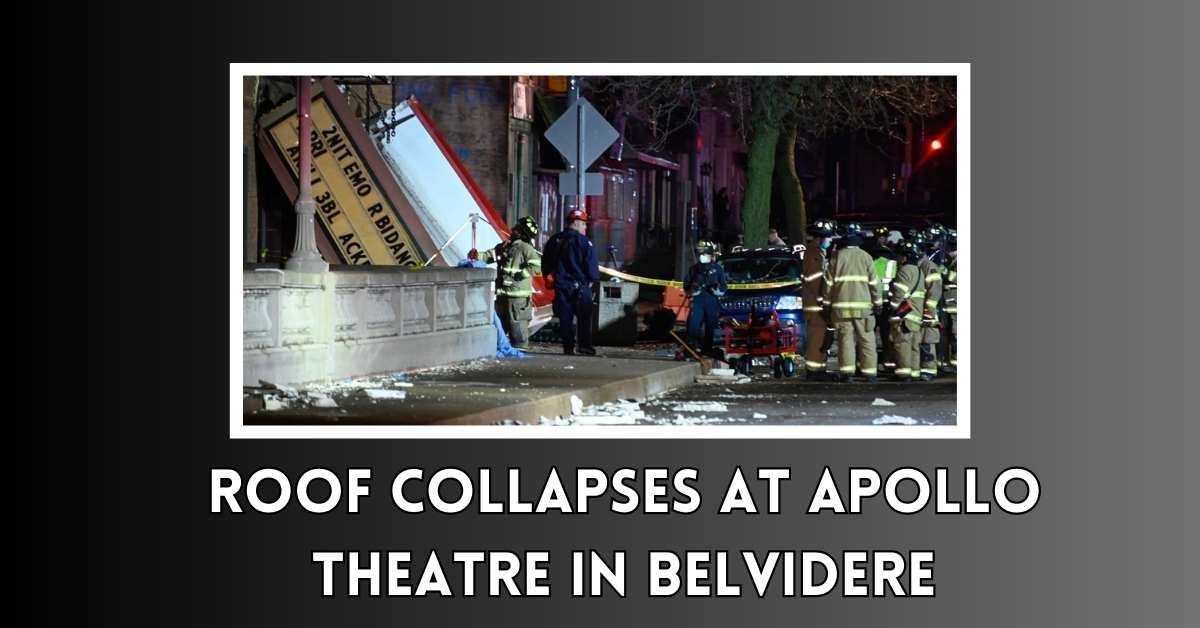Since the 1960s, the Apollo Theatre in Belvidere, Illinois, has been a popular place for people to get together and enjoy concerts, plays, and other events. But on the night of April 2, 2023, tragedy struck when the theater’s roof fell in during a show.
People in the area and beyond were shocked by what happened, and many were worried about the safety of those who were in the theater at the time. In this response, we’ll tell you more about what happened and what happened afterward, as well as answer some of the most common questions about the collapse.
Roof Collapses at Apollo Theatre in Belvidere
Following terrible storms and tornadoes that tore across the South and Midwest on Friday evening, authorities reported one fatality and 28 injuries from a whole roof collapse at the Apollo Theatre in Belvidere, Illinois. According to the event organizer, there were about 260 people inside the venue for a heavy metal rock concert at the time of the collapse, including visitors, performers, and staff.
Belvidere is located in northern Illinois, 14 miles outside of Rockford. Despite the region experiencing extreme weather, no reports of a “real tornado” striking the area, according to Belvidere Fire Chief Shawn Schadle. According to Kevin Sur, a spokesman for the Illinois Emergency Management Agency, three additional persons perished in Crawford County in southern Illinois as a result of a domestic building collapsing on Friday due to the extreme weather.
The deaths that have been officially confirmed in Illinois bring the total number of fatalities from Friday’s extreme weather outbreak to 21 across six states. 28 individuals were taken by ambulance from the Apollo Theatre to local hospitals, according to Schadle.
To know more latest news, click on the link given below:
- Spears and Asghari Spotted Without Wedding Rings
- Is It True ESPN Fired Jalen Rose? The Truth Behind Malika Andrews’ Jalen Rose Video Tweet!
- Miranda Lambert Cancels Las Vegas Concert: Here’s What Went Wrong [Details]
18 people suffered from moderate injuries, five from mild ones, and five from serious ones. He said, “Clearly, there were likely other patients carried by personal automobile.” Crews entering the building helped pull victims out from under the debris during their initial response. A triage center and a victim relocation point were set up by the crews.
It took a lot of effort to rescue individuals who were originally hurt, according to Schadle, not only from all the public safety organizations, police, and fire but also from onlookers.
The chief declared that the theater had undergone a primary search. The MABAS 8 TRT rescue crew is still working behind us at this time. The secondary searches are being conducted by them. They are also considering how to stabilize the structure, according to Schadle.
JB Pritzker, governor of Illinois, stated that he is “closely monitoring” the issue. He tweeted on Friday night, “I’ve been in touch with officials for updates and to direct any available resources we can. Please heed the advice of all local authorities as we learn more.
One of the metal bands slated to play at the festival, Morbid Angel, posted on Facebook that the concert will not go on as planned and urged attendees to “take shelter and be safe.”
“We are presently taking cover, and we want to offer our support and wish for everyone’s safety at the event tonight. Right now, our first concern is making sure that everyone presents tonight leaves the theater safely, according to the band.
According to a brochure for the concert, Revocation, Skeleton Remains, and Crypta were the other bands scheduled to perform on Friday night. The cause of the collapse is being looked into. No first responders were hurt, according to Schadle, and so yet no one has reported missing.
According to a statement from the agency’s director, Alicia Tate-Nadeau, “the Illinois Emergency Management Agency is working closely with our local and county public safety partners and Emergency Managers to assess the widespread damages across the state, including here at the Apollo Theatre in Belvidere in Boone County, and Robinson in Crawford County.” We are still evaluating more impacts in numerous counties around Illinois.
